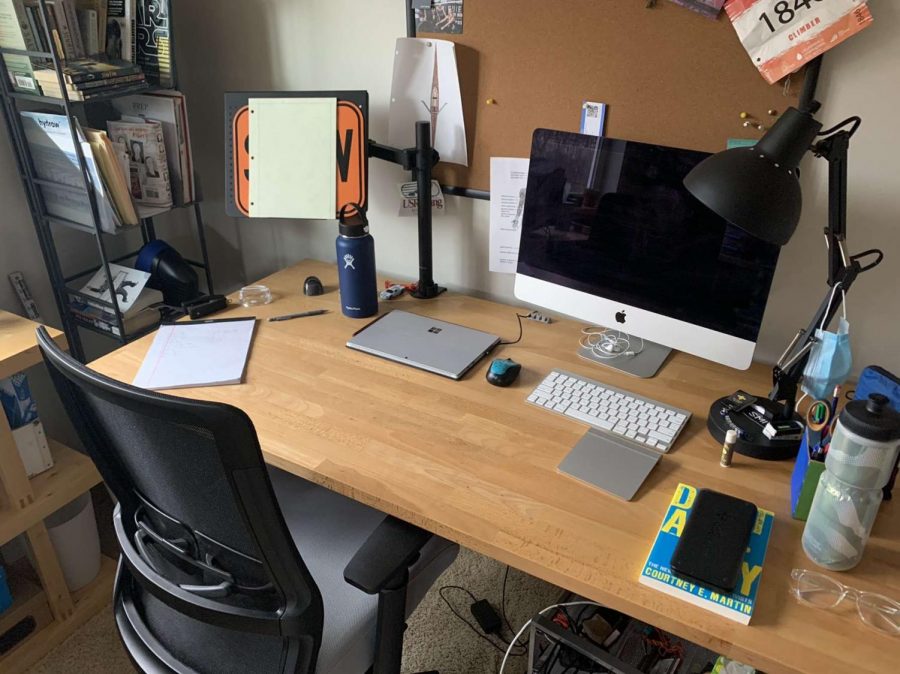Lessons Learned
Students and Faculty Adapt to Online Learning
Senior Derek Hissong has organized his home study space to maximize productivity and minimize distractions.
February 24, 2021
In March of 2020, online school for Seattle Prep students consisted of an email around 8:00 am from every teacher, assigning classwork and homework that needed to be completed by the end of the day. Though, it gradually became what we view as online school today: daily zoom calls and homework to complete before the next class. Teachers and students alike have come a long way since the beginning of online school. There was a lot of trial and error that helped students and faculty learn what worked and what didn’t. The lessons learned will provide beneficial changes to one’s work ethic and mental health both as online school continues and in-person school blossoms.
As several students reflected back on the initial workload of online learning, they remember it feeling stressful and overwhelming, partially due all schoolwork being entirely self-motivated. Junior Ava Berard, in particular, shared how juggling everything at first was stressful and she needed a solution. When looking at her study skills that she needed to improve, she narrowed in on her time management. She set school as her top priority but made sure to factor in enough time for extra curriculars to provide a break from her screen. Once this skill of time management was more routine for Berard, she explained how a level of stress was lifted off of her, and she felt her mental health improve.
Senior Derek Hissong made sure he kept his workspace organized and quiet so that he could put enough focus into his work. In order to self-manage his work, tests, and extra curriculars he made To-Do lists. He credited his reduced stress to these lists because this “helps [him] visualize all [he] has due and makes it easier to break down into ‘bite-sized’ pieces.”
While online learning continues to provide Hissong with several opportunities for growth like learning to stay off his phone during class and breaks, he wanted to note that Prep has been and continues to be a tremendous help to him throughout the process. He shared that “[He] definitely wouldn’t be as confident in [his] classes without the level of commitment all the faculty bestow upon [students] to make sure [they] understand what [they] are learning. [He] have also appreciated how they understand problems come up and that sometimes [students] have to miss or come late to class.”
The Prep faculty has made many changes to their teaching plans and styles to adjust to online learning—some of these things students may be aware of and others they may not. For Math Teacher Mrs. Pasztor, she put in several extra hours planning lessons and activities for students to be sure she is organized and giving the best tools she can to her students.
Pasztor explained that she noticed her stress levels go up through the amount of work online school brought and started noticing it in her students too. She understands the stress that school can bring, especially math, but she sees her students working hard and she had continued to work hard to teach them the best she can as well. She shared that “Students appreciate – more than ever – if the teacher is organized and cares about them and supports them.”
For Collegio Teacher Mr. Barmore, a priority for him became building rapport with students. Before asking a student a question in class, Barmore “start[s] with a simple, ‘Hey, Jennifer, unmute and tell me how you’re doing today.’ Sometimes that leads to another, short conversation; sometimes not.”
Barmore’s effort to keep a casual and engaging social atmosphere are an attempt to make online classes feel less isolated and more like being in person when students and faculty could exchange funny stories and jokes.
Pasztor explained that “[She tried] to view online teaching as a new opportunity for growth.” Students and faculty alike have all adapted in various ways to this new way of learning and there is likely still more to learn.



